
CNA Newsroom, May 20, 2024 / 14:44 pm (CNA).
In a new interview, Cardinal Jean-Claude Hollerich, SJ, suggested that the Church’s position on female priests is not set in stone and should be discussed further, at the same time warning of triggering “a huge backlash.”
Speaking to the official Swiss Catholic portal kath.ch on May 17, Hollerich, who is the archbishop of Luxembourg, said the prohibition against ordaining women was “not an infallible doctrinal decision” and could be changed over time with arguments.
“The way I see it, most bishops are in favor of a greater role for women in the Church,” the Jesuit cardinal said. “I am in favor of women feeling fully equal in the Church. And we will also work toward this. I don’t know if that necessarily has to include ordination to the priesthood. You can’t tie everything to the priesthood alone. That would be clericalization.”
When asked whether he thought Pope Francis would introduce female priests, Hollerich replied: “It’s very difficult to say. The pope is sometimes good for surprises.”
The archbishop of Luxemburg added: “But I would actually say no. Shortly before the synod, there was a ‘dubia’ from a few cardinals. They asked whether John Paul II’s rejection of the priesthood of women was binding for the Church. Francis replied very wisely: It is binding, but not forever. And he also said that theology would have to discuss this further.”
The cardinal, who has previously courted controversy on doctrinal matters, emphasized the need for ongoing discussion.
“It means that it is not an infallible doctrinal decision. It can be changed. It needs arguments and time,” Hollerich said.
At the same time, the Jesuit cautioned against pushing too hard for changes, noting that “if you push too much, you won’t achieve much. You have to be cautious, take one step at a time, and then you might be able to go very far.”
The interview was conducted by Jacqueline Straub, who works for the official portal of the Church in Switzerland and publicly describes herself as “called to be a Roman Catholic priest.”
Her assertion to Hollerich that women were forced to take a back seat in the Church was “based on a typically European principle of the individual,” the cardinal responded.
Citing the example of blessing homosexual unions after Fiducia Supplicans, Hollerich warned of a potentially “huge backlash” if the Vatican were to introduce the ordination of women to the priesthood.
“We have to have these discussions with the whole Church; otherwise, we will have huge problems later. Then the Catholic Church will fall apart.”
In 1994, Pope John Paul II, citing the Church’s traditional teaching, declared in the apostolic letter Ordinatio Sacerdotalis: “Wherefore, in order that all doubt may be removed regarding a matter of great importance, a matter which pertains to the Church’s divine constitution itself, in virtue of my ministry of confirming the brethren (cf. Lk 22:32) I declare that the Church has no authority whatsoever to confer priestly ordination on women and that this judgment is to be definitively held by all the Church’s faithful.”
If you value the news and views Catholic World Report provides, please consider donating to support our efforts. Your contribution will help us continue to make CWR available to all readers worldwide for free, without a subscription. Thank you for your generosity!
Click here for more information on donating to CWR. Click here to sign up for our newsletter.





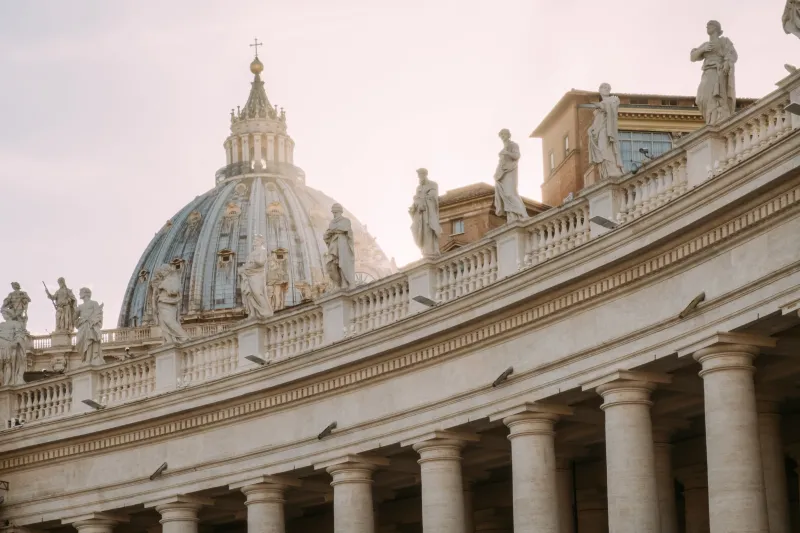
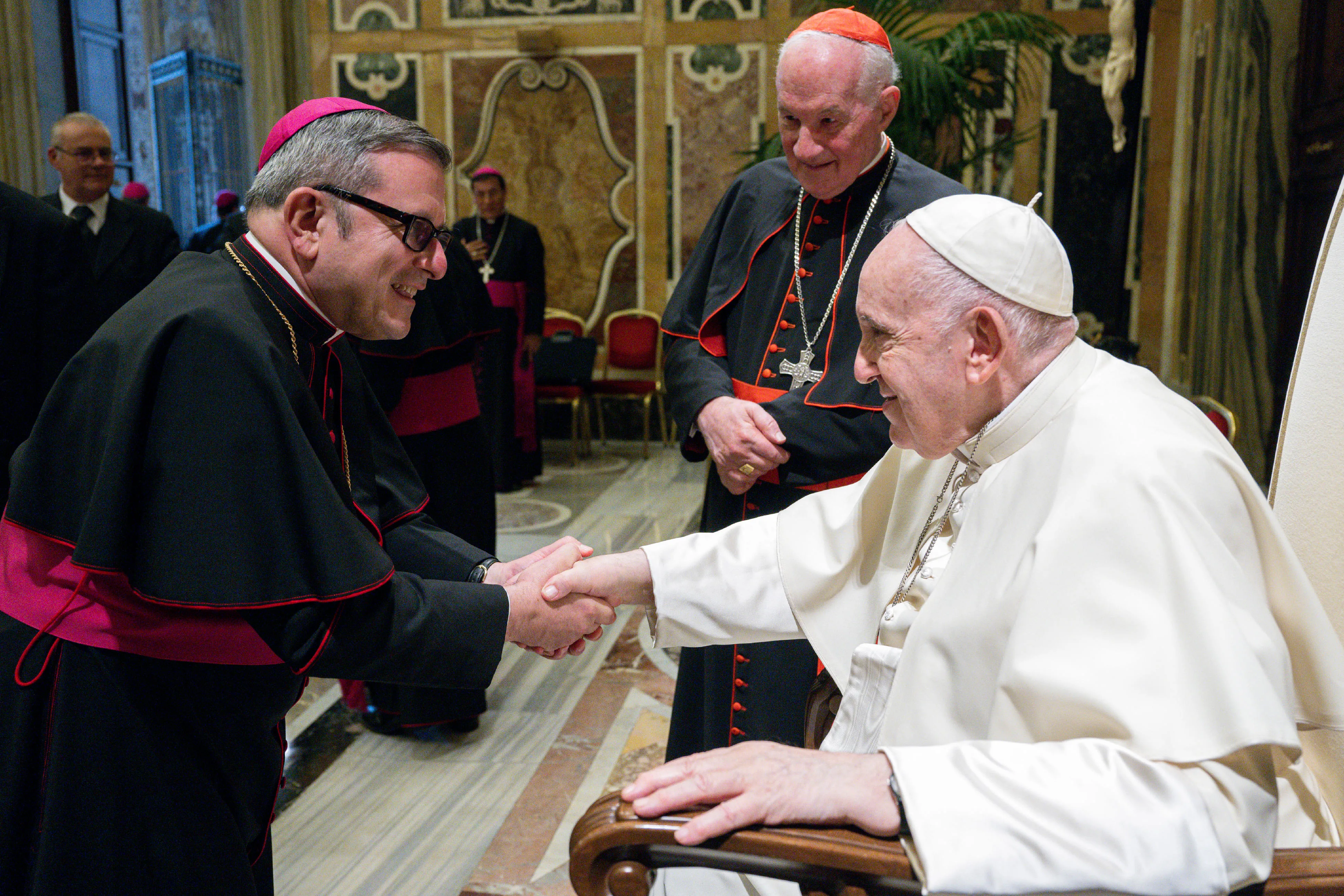
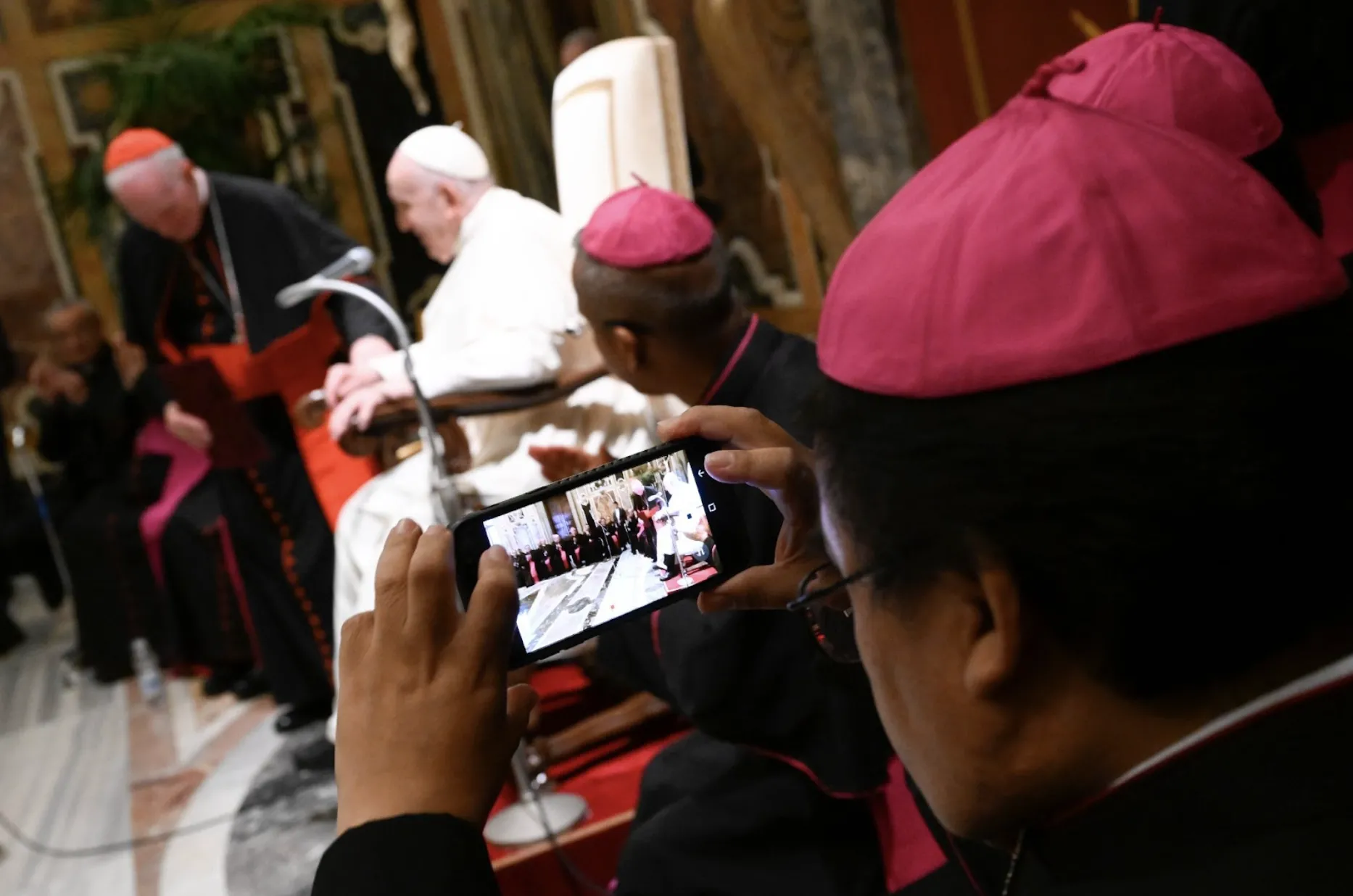
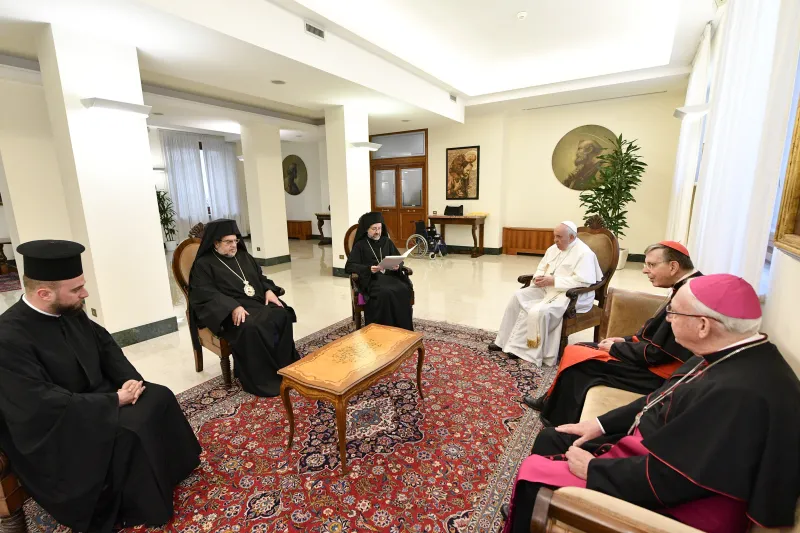
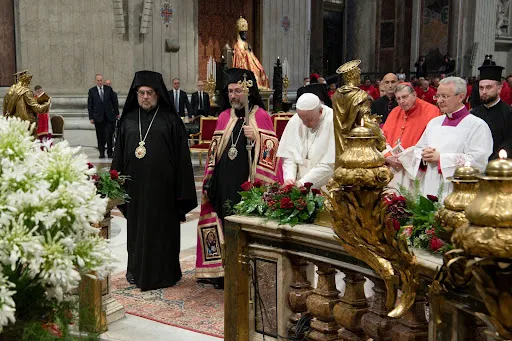
Nothing appears set in stone to this Jesuit. Where does he get his inspirations? Perhaps Tucho should sit down with him for a bit of probing.
Look. Let’s be honest.
If Rupnik is acceptable priestly material — as Bergoglio’s acquiescence indicates he clearly is— then who isn’t?
Women? I say, bring ‘em on!
Illegal immigrants? Why not?
High school dropouts? Home remodeling contractors? Attorneys? Professional sports figures?
On what basis can we say no to anyone, so long as Rupnik remains a clergyman in good standing?
And, thus, Hollerich’s and Bergoglio’s ‘New Catholique Church’ lurches inexorably — indeed, progressively — into its post-Christian future.
I.e., the past.
Briney. There you go again. Dispagaging women. “Women? I say, bring ‘em on!
Illegal immigrants? Why not?”. Holy Catholic women??? Walk in their shoes!
He wasn’t disparaging women. Clue in.
More code language of gradualism from the clericalist Hollerich!
The contrived question before the study groups and the Synod is about female deacons. But, Hollerich, in counseling small steps, already maneuvers much more broadly. Says he: “…we will also work toward this. I don’t know if that necessarily has to include ordination to the priesthood. You can’t tie everything to the priesthood alone. That would be clericalization.”
The endgame of a female priesthood already waiting in the wing?
Such that the cover story for ordained deaconesses, itself, is the small-step already—on the path to an equally invalid female “priesthood”? Two points of clarification:
FIRST, the historical documentation does support an ordained role for so-called deaconesses. Instead, the ordained diaconate is an integral part of the threefold ordination established by Jesus Christ: bishops and priests, and their deacons. It’s neither culturally based nor separable. Moreover, the role of Lay Ecclesial Ministers exists already (!), by virtue of their baptism and confirmation.
SECOND, in his view of things male and female, why does the perplexed Hollerich remind us of the Anglican chauvinist cleric in the movie “Shadowlands”? The clericalist explains menfolk as intelligent versus womenfolk as only emotional. The “feeling” thingy…
As he dialogues (!) with C.S. Lewis’ new American friend, Joy Gresham (played by Debra Winger), Gresham first allows that different cultures might “have different manners of discourse”—and then wonders aloud: “Are you trying to be offensive, or merely stupid?”
Hollerich’s patronizing theology: “I am in favor of women feeling [!] fully equal in the Church.”
said the prohibition against ordaining women was “not an infallible doctrinal decision” and could be changed over time with arguments.(sic)
Incorrect, Jean-Claude, you goofy Jesuit.
Wherefore, in order that all doubt may be removed regarding a matter of great importance, a matter which pertains to the Church’s divine constitution itself, in virtue of my ministry of confirming the brethren (cf. Lk 22:32) I declare that the Church has no authority whatsoever to confer priestly ordination on women and that this judgment is to be definitively held by all the Church’s faithful.
Guess what? Scratch below the surface and so often you’ll find homosexuality.
Lay men and women are completely equal in the Church. Laywomen and laymen have the exact same rights and can be involved in as much as any layman can. This is so tiresome. If he’s talking power…well that isn’t what ordination is about.
Can you imagine how much worse the Church would be if the contraceptive theology of this pontificate had come immediately after St. Paul VI? The pontificates of St. John Paul II and Benedict XVI providentially provided a post-Vatican II floor to build the Church back up after the category 5 hurricane Francis.
Praise be Jesus Christ, now and forever! This too shall pass. “Hold fast” to the One, Holy, Catholic and Apostolic Church, the Body of Christ!
Let the Church decide.
It already has
Why do women need to be priest? Some of my women friends want so badly to have the Catholic Church to allow women priest. My women friends believe this will give women power and a say in the Church. Our Mother Mary had little say in the Gospels, yet she was exalted to Queen of Heaven and assumed into Heaven.
As Hollerich said, “When sneaking up on dose cwafty infawwible teachings, you must be vewy vewy quailfuwl.”
Gradualism, or precarious careening? As we struggle with what is the Church to become after Fiducia Supplicans, we awaken to the spectacular reality of an occultist priest, serial rapist of nuns protected by His Holiness afforded all the faculties and respect of a priest in good standing.
Female priests and John Paul’s formal declaration that they cannot be priests?Simply clericalist formality from an age locked into static conceptualizations of the Church. Francis is the new age. Hollerich the court jester entertaining His Holiness with naive suggestions apparently already affixed in our Pope’s supple ever inventive intellect. “You have to be open to everything. The Church is like that: Everyone, everyone, everyone”, His Holiness in response to Norah O’Donnell’s 60 Minutes interview subtly inserting everything. Our Pontiff cannot jettison tradition and literally replace Christ by inferring everything to himself.
These wonderful modernizers, imagining change will bring in new market shares of consumers and better support for their own retirements, miss one crucial point every time…
If the Church has been wrong about something for 2000yrs, and only now discovers the mistake, then how can it be right about anything? If its infallible teachings are now judged fallible, did it get anything right at all, to include the resurrection, and how can one know?
Why would anyone believe anything it teaches when it likely then all a farce?
Roma locuta est; causa finita est.
Good exorcism session of Msgr Rossetti – that also mentions how wounding words and such can lead persons to make (negative ) ‘inner vows ‘ – how one would not love/ trust etc: and how to break such – (at the 1.36 mark , for those short on time )
– https://www.youtube.com/watch?v=OB8uzH582Z8
Such negative inner vows against The Cross/ suffering or parental figures, as the urge /decision to destroy – Papacy ,The Church, own identity / each other in wrong choices – the discords and issues !
Good marriage preparation along with sessions such as above, to help families to discern these areas , spouses making good inner vows – such as in critical areas of chastity , to help restore dignity of women – all such to add to the help needed in our times ! Mercy !
I have had concerns with women clerics. However, my research and dialog with the CWR editor has caused further dilemma.
Excerpts: John Paul II’s rejection of the priesthood of women was binding for the Church. St. John Paul did not explain why the church is “bound”. Why does anyone care? The edict has been “cast in concrete”. Cardinal Hollerich… Citing the example of blessing homosexual unions after Fiducia Supplicans, Hollerich warned of a potentially “HUGE BACKLASH” if the Vatican were to introduce the ordination of women to the priesthood.
Amazing! Comparing homosexual marriage to women ordination is an abomination.
All that I have read on female ordination has been founded largely in mythology… Holy mother church is female, so women can’t be included. Jesus chose only males as his apostles.
Just what would ordained women offer to the church?
CNA: Church definitively said “no” to priestly ordination for women in the 1970s, they closed the door to half of the population of the Church. St. Augustine said that the soul does not have a sex. How can the church not be anti-women…if women are not part of the decision making? (Magesterium)
Was Christ, a Rabbi, concernned with the status of holy women? Would he accept today’s female rabbinical?
Lets not forget women are the most loved and productive nurturers of MANKIND. Today’s plagued male clerics, priest pedophilia, have placed many other ordained under scrutiny. A fresh air infusion of holy women must help a church in visible decline.
“St. John Paul did not explain why the church is “bound”.”
Good grief. Read the actual document. It’s shorter than most of your comments here.
Carl. No, the read of Pope Paul’s words are many and the complexity, “Declaration Inter Insigniores” may confuse the average uninitiated Catholic. And, I see his reason for not ordaining still what I observed in my earlier readings. There may have been a condition for men only… Wijngaard Institute for Catholic research: “the decision by the Swedish Lutheran Church in September of that year to admit women to the pastoral office. This caused a sensation and occasioned numerous commentaries”.
Pope Paul: “the Catholic Church from the beginning always been reserved to men alone”. That translates into the exclusion of 1/2 of the Catholic population. “God’s plan”? Cardinal Hollerich says there will be a BACKLASH in the church if women are ordained. He did not elaborate on WHOM the backlashers are. A bunch of old men?
No question the Church has made many changes to allow women more power. However, I would give a high mark of BLAND.
Thank you for your guidance.
I’ll sum it for you: “Jesus said and did it, we believe and follow it.”
Now, there are a host of theological reasons. An excellent guide is Women in the Priesthood? A Systematic Analysis in the Light of the Order of Creation and Redemption (Ignatius Press) by Manfred Hauke.
By the way, should I, as a man, be angry that God only “allows” women to bear and have children?
“God said it, I believe it & that settles it for me…”
🙂
Does it mean anything that the Redeemer assumed human nature as a male? After all, God could have assumed human nature as a woman. God didn’t. Are you upset about that? Perhaps it has a significance that’s eluded you.
Peeling an onion, layer by layer, results in No Onion ; the Marxist Deconstructivism of the McCarrick Legacy Band must be stopped while there is still an onion to be saved.
‘At the same time, the Jesuit cautioned against pushing too hard for changes, noting that “if you push too much, you won’t achieve much. You have to be cautious, take one step at a time, and then you might be able to go very far.”’ The cardinal could not have spoken more clearly the progressive manifesto! That has to be one of the most eye-opening statements of a left-wing prelate. “Dialogue” has nothing to do with the path of reason and faith toward the attainment of the truth, but with the slow and steady approach toward a present and predisposed, misshapen, human desire.
Pushing for female priesthood means those who do so put themselves above Christ, the reality of His presence in the Eucharist and also the reality of the Last Supper here and now.
Jesus Christ is a Man; each Eucharist is the Last Supper; a priest is an icon of Christ Who is a Man hence he can only be a man. A female priest conveys a lie and the Church cannot accept that lie. This is enough to end the calls for “a dialogue” (sounds like a dialogue with oneself is envisaged here and this is probably it is endless).
Speaking of “empowering women”. The most exalted service typically does not have any power. I mean not an earthly understanding of “a power” which the proponents of female priesthood seem to employ. For example, a prophet has no earthly power and no recognition but he has plentiful rejection and hatred and often a violent death. Yet a prophetic vocation is one of the most exalted in the Church. God can choose a woman for this vocation and the examples are abundant. The truth is that the power which is given to a person by God is very different from that power that proponents of a female ordination speak about. They appear to speak of a power given by men – more precisely, by themselves.
And so, any woman (or a man) right now can prophecy and chastise priests including the Bishops and Popes – if God calls them to do so. A woman can write theology, teach, be a spiritual director, even be (in an Orthodox tradition) “a spiritual mother”, even to a Patriarch. A woman can only not be a priest because God didn’t give her a power to do so – just like He did not give men a power to fall pregnant and to give birth.
Hence, I perceive those “dialogues” – about anything really – to be the attempt to swap God-given power with man-given power, in essence to usurp God’s ability to bestow a power upon those He chooses. I.e., narcissism again.
Women cannot be ordained. MorganD is wrong. The Catholic Church, unlike the protestant faiths, doesn’t change to keep aligned with the current world view on homosexuality, and women “priests”. Sorry to break MorganD’s heart, but a few days ago on that CBS 60 minutes interview, Pope Francis reaffirmed that women cannot be ordained to the priesthood or the diaconate.
This is not discrimination against women. This is preserving divine law, while giving women the opportunity to respectfully admire the office of priesthood, which is reserved for chaste, straight men who are acting In Persona Christi.
“while giving women the opportunity to respectfully admire the office of priesthood”
I don’t think Our Lord would say to St Mary Magdalene: “Via choosing males for priesthood I am giving you an opportunity to admire the office of priesthood” because it sounds condescending and… meaningless. Our Lord would simply say as a matter of fact “priesthood is for men only”, that is it.
Curiously, your phrase omits men. Let’s be equal here and say “while giving men and women the opportunity to respectfully admire the office of priesthood”. Or even better “the office of priesthood is worthy of respect”. But, if it is universally (i.e. by men and woman alike) worthy of respect, there can be no such a thing as “giving women the opportunity to respectfully admire the office of priesthood”.
Thanks for pointing that out Anna. Yes, everyone should respect the office of priesthood, both male and female. Looking back over my comment, I also realized that preserving the male priesthood hopefully will give both men and women the opportunity to witness what a pure, honest man is, and take his (and Christ’s) example as you’re living out your own vocation. Also I like your comment above my old one. This constant push for a female priesthood is ridiculously futile. God bless. ☦️
Jesus Christ served and suffered humiliations. He died a painful death but rose again. A desire to humbly serve as Christ did is a noble intention. A genuine aspiration to be Christ-like deserves careful and utmost attention.
And this comment relates specifically and directly to the content of the article how?
The greatest and most perfect human person ever created by God is a woman. She is a singularity. For a time, even God Himself was her unborn Child!
“Hail, O Lady, Holy Queen, God’s Holy Mother Mary! You have been made the Virgin Church and chosen by the most Holy Father in heaven.
You has he consecrated with His most holy beloved Son and the Holy Spirit the Paraclete.
In You there has been, and is, all fullness of Grace, and all that is good.
Hail His Palace! Hail His Tabernacle! Hail His Dwelling Place! Hail His Garment! Hail His Handmaid! Hail His Mother!
And (hail) all you holy Virtues [in her] which by the grace and enlightenment of the Holy Spirit are poured forth into the hearts of the faithful, that from faithless souls you virtues may make them faithful to God!”
The Salutation to Our Lady by St. Francis of Assisi